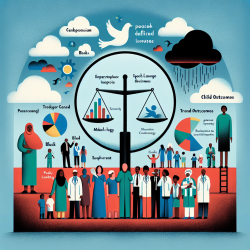Introduction
The twenty-first century has been marked by the rapid evolution of Artificial Intelligence (AI), which is reshaping various fields, including research ethics. The recent scoping review titled "Specific challenges posed by artificial intelligence in research ethics" by Bouhouita-Guermech, Gogognon, and Bélisle-Pipon highlights the ethical dilemmas and challenges AI presents to research ethics boards (REBs). This blog post aims to provide practitioners with insights on how to improve their skills by implementing the outcomes of this research or encouraging further investigation into AI's impact on research ethics.
Understanding the Challenges
The research identifies several key challenges posed by AI in research ethics:
- Responsibility: AI systems often blur the lines of accountability, making it difficult to assign responsibility for decisions made by AI-driven processes.
- Privacy: With AI's ability to process vast amounts of data, concerns about data privacy and the potential for misuse are paramount.
- Transparency: The "black box" nature of AI systems can obscure how decisions are made, challenging the transparency required in ethical research practices.
Improving Practitioner Skills
Practitioners can enhance their skills and ethical practices by focusing on the following areas:
- Stay Informed: Keep abreast of the latest developments in AI ethics and guidelines. Engage with literature and participate in discussions to understand the evolving landscape.
- Advocate for Clear Guidelines: Encourage the development and implementation of standard guidelines for evaluating AI research ethics. This will help REBs better assess AI-driven projects.
- Foster Interdisciplinary Collaboration: Work with experts from various fields to address the multifaceted challenges posed by AI. This collaboration can lead to more comprehensive ethical evaluations.
- Promote Transparency: Ensure that AI systems used in research are as transparent as possible. This includes understanding how decisions are made and communicating this to stakeholders.
Encouraging Further Research
The review highlights the need for ongoing research to address the gaps in AI-specific research ethics. Practitioners are encouraged to:
- Conduct Studies: Engage in research that explores the ethical implications of AI in various contexts, contributing to the body of knowledge.
- Participate in Ethical Discussions: Join forums and workshops that focus on AI ethics to share insights and learn from peers.
- Support Policy Development: Advocate for policies that address the unique challenges of AI in research ethics, ensuring they are adaptable to technological advancements.
Conclusion
AI presents both opportunities and challenges in the realm of research ethics. By staying informed, advocating for clear guidelines, fostering collaboration, and promoting transparency, practitioners can navigate these challenges effectively. To delve deeper into the specific challenges posed by AI in research ethics, practitioners are encouraged to read the original research paper: Specific challenges posed by artificial intelligence in research ethics.










